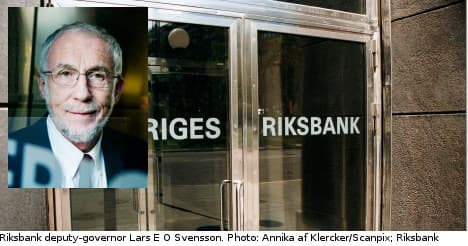Ex-Riksbank official bashes rate policies

Lars E O Svensson, the former Deputy Governor of the Riksbank who left in a dispute about interest rates, has renewed his criticism of the central bank's monetary policy, arguing it has increased unemployment.
In a speech at a conference on Monday to mark 20 years of the Riksbank's two-percent inflation target, Svensson alleged the bank had failed to fulfill its goal of stable prices and a sustainable level of unemployment.
He blamed policies pushed in recent years under current Riksbank head Stefan Ingves that have been designed to reduce the risks associated with Sweden's high-levels of household debt.
"Household debt levels shouldn't be a new goal for the Riksbank," Svensson said in his speech.
Svensson, considered an interest rate "dove" during his tenure at the Riksbank, left the bank in frustration in mid-May saying he had "failed" to convince his colleagues of the merits of keeping interest rates low.
In Monday's speech, he argued that Sweden's unemployment rate would be one percent lower today if Sweden's benchmark interest rate, the repo rate, had remained at 0.25 percent since 2010.
And inflation would likely be closer to the Riksbank goal of two percent, Svensson continued, rather than much lower levels experienced since mid-2012.
He argued that hiking the repo rate to two percent before then needing to lower it again to today's one percent level has had "negligible" effects on lowering the level of household debt in Sweden.
Riksbank Deputy Governor Karolina Ekholm agreed that inflation levels were lower than she'd like, but added that inflation targeting was still relevant in the wake of the financial crisis.
"For me, it's the lynchpin in what we do," she told the TT news agency.
Ingves, however, disagreed with Svensson's critique of the two-percent inflation target.
"For the most part, it's worked well, especially of you look at how things were in the early- and mid-1990s," he told TT.
"Looking back, it's been successful."
The Riksbank's next interest rate decision is due in early July, and the addition of two new members to the governing board combined with the ongoing economic uncertainty in Europe makes it harder than usual to predict whether or not there will be a change in the repo rate.
"Certain things look stronger than what we included in our last forecast and some things look a little weaker," said Ekholm.
TT/The Local/dl
Comments
See Also
In a speech at a conference on Monday to mark 20 years of the Riksbank's two-percent inflation target, Svensson alleged the bank had failed to fulfill its goal of stable prices and a sustainable level of unemployment.
He blamed policies pushed in recent years under current Riksbank head Stefan Ingves that have been designed to reduce the risks associated with Sweden's high-levels of household debt.
"Household debt levels shouldn't be a new goal for the Riksbank," Svensson said in his speech.
Svensson, considered an interest rate "dove" during his tenure at the Riksbank, left the bank in frustration in mid-May saying he had "failed" to convince his colleagues of the merits of keeping interest rates low.
In Monday's speech, he argued that Sweden's unemployment rate would be one percent lower today if Sweden's benchmark interest rate, the repo rate, had remained at 0.25 percent since 2010.
And inflation would likely be closer to the Riksbank goal of two percent, Svensson continued, rather than much lower levels experienced since mid-2012.
He argued that hiking the repo rate to two percent before then needing to lower it again to today's one percent level has had "negligible" effects on lowering the level of household debt in Sweden.
Riksbank Deputy Governor Karolina Ekholm agreed that inflation levels were lower than she'd like, but added that inflation targeting was still relevant in the wake of the financial crisis.
"For me, it's the lynchpin in what we do," she told the TT news agency.
Ingves, however, disagreed with Svensson's critique of the two-percent inflation target.
"For the most part, it's worked well, especially of you look at how things were in the early- and mid-1990s," he told TT.
"Looking back, it's been successful."
The Riksbank's next interest rate decision is due in early July, and the addition of two new members to the governing board combined with the ongoing economic uncertainty in Europe makes it harder than usual to predict whether or not there will be a change in the repo rate.
"Certain things look stronger than what we included in our last forecast and some things look a little weaker," said Ekholm.
TT/The Local/dl
Join the conversation in our comments section below. Share your own views and experience and if you have a question or suggestion for our journalists then email us at [email protected].
Please keep comments civil, constructive and on topic – and make sure to read our terms of use before getting involved.
Please log in here to leave a comment.